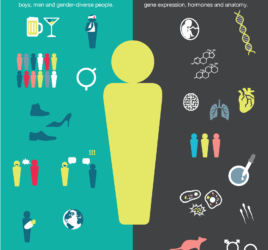
Treating ADHD effectively – Do we miss our opportunities?
Imagine a child showing symptoms of attention deficit hyperactivity disorder (ADHD) from early childhood on. The child never learned how to pay attention. At the age of 8, a very experienced child psychiatrist diagnoses ADHD and suggests pharmacological treatment. The treatment is effective as indicated by both improved performances in cognitive tests and parents’ reports about favourable behavioural changes. The treatment is thus successful and we expect the child to function well and to apply its improved functions effectively.
This vignette describes the current understanding and practice of treatment of ADHD in childhood as it prevails in many places. In this post, I briefly question this understanding. There is already a lot of discussion (partly emotional and lacking objectivity) about the pharmacological treatment of ADHD. Here however, I do not want to go the route of questioning pharmacological treatment in general. Instead, I would like to start at the point that there is a child which indeed suffers from ADHD and which indeed benefits from pharmacological treatment, just as depicted in the vignette above.
With my colleagues, I have been researching the cognition of individuals with ADHD for many years. In brief, our findings regarding the effects of pharmacological treatment suggest that individuals with ADHD perform poorly in cognitive tests when compared to individuals without ADHD. Pharmacological treatment improves some but not all aspects of their cognition. When improvements are observed, individuals with ADHD often do not reach an undisturbed level of functioning. However, pharmacological treatment may even deteriorate functioning.
The latter finding deserves some explanation: We found that handwriting fluency of children with ADHD (i.e. the fluency with which handwriting movements are executed) was impaired following pharmacological treatment with stimulants. At the same time, however, neatness of handwriting improved.
“This means that pharmacological treatment was accompanied by a shift from a fluent but poor handwriting to a dysfluent but (more) legible handwriting.”
This shift was NOT a primary effect of the treatment but rather a secondary effect, because pharmacological treatment improved attention (an often replicated finding). Children used their improved attention to concentrate on the execution of handwriting movements, a process which actually does not need concentration and which gets even impaired by concentration. The reason why children with ADHD concentrated on the writing process was their desire to produce a neat handwriting, as parents and teachers often place particular emphasis upon neat handwriting. So children with ADHD actually did everything right from their perspective, not knowing that what they do is the worst thing to do: They have a poor handwriting — they often get criticised by parents and teachers — they receive pharmacological treatment and are suddenly able to focus attention — as they hear often enough to focus attention, they do! — because they focus their attention on something that gets impaired when performed under attentional control, they fail!
“The mistake happening here makes me wonder whether our general understanding of the treatment of ADHD is appropriate, because we assume that children just know what to do with their improved functioning resulting from pharmacological treatment.”
One has to admit that despite the many improvements observed in research facilities, there is often only little translation from the research environment into daily life. A good example is that cognition improves considerably following pharmacological treatment, but that academic performance often does not. This incongruence might be explained by mechanisms as observed in our studies on handwriting: Children with ADHD just do not know what to do with their improved functions. This is actually our fault, as we do not provide sufficient instructions or opportunities for children with ADHD enabling them to catch up with those contents and skills they missed in the past because of their untreated ADHD. Our current understanding assumes that they picked up everything taught to them in the past and that they just cannot make use of their knowledge because of a current imbalance or deficiency of crucial neurotransmitters. It is further assumed that these imbalances/deficiencies are compensated with pharmacological treatment and that following medication children can immediately access and apply all their “hidden knowledge”. Obviously, we are wrong here.
I wonder how we could allow that such a misguided idea became so established. To make my point, please allow me an analogy for illustration:
Imagine a child who is born with a crippled leg. The child never learned to walk. At the age of 8, a very gifted and skilled surgeon offers to do a very unique surgery, repairing the skeletal and muscular injury which caused the disability. The surgery is performed successfully and the child comes out of the anaesthesia and recovers over the next days from the surgery.
Would we expect that the child can immediately dance? Of course NOT! We would not even expect the child to walk since muscles have to be built up, a feeling of balance has to be developed, movement control to be practiced, etc. So very basic prerequisites of movement have to be trained as they have not been acquired in the past. And, presumably, we would all agree that the child should get all active support possible to facilitate it making up for its shortfalls. When we see things this way here, why is our understanding of ADHD and its pharmacological treatment so different?
Related articles:
Groen, Y., Gaastra, G.F., Lewis-Evans, B., & Tucha, O. (2013). Risky behavior in gambling tasks in individuals with ADHD – A systematic literature review. PLoS ONE, 8, e74909.
Tucha, L., Tucha, O., Sontag, T.A., Stasik, D., Laufkötter, R., & Lange, K.W. (2011). Differential effects of methylphenidate on problem solving in adults with ADHD. Journal of Attention Disorders, 15, 161-173.
Tucha, O., & Lange, K.W. (2001). Effects of methylphenidate on kinematic aspects of handwriting in hyperactive boys. Journal of Abnormal Child Psychology, 29, 351-356.
Tucha, O., & Lange, K.W. (2005). The effect of conscious control on handwriting in children with attention deficit hyperactivity disorder. Journal of Attention Disorders, 9, 323-332.
Tucha, O. , Prell, S., Mecklinger, L., Bormann-Kischkel, C., Kübber, S., Linder, M., Walitza, S., & Lange, K.W. (2006). Effects of methylphenidate on multiple components of attention in children with attention deficit hyperactivity disorder. Psychopharmacology, 185, 315-326.
Tucha, O., Tucha, L., & Lange, K.W. (2008). Graphonomics, automaticity and handwriting. Literacy, 42, 145-155.
NOTE: Image by UptownRookie, licenced under CC BY 2.0



